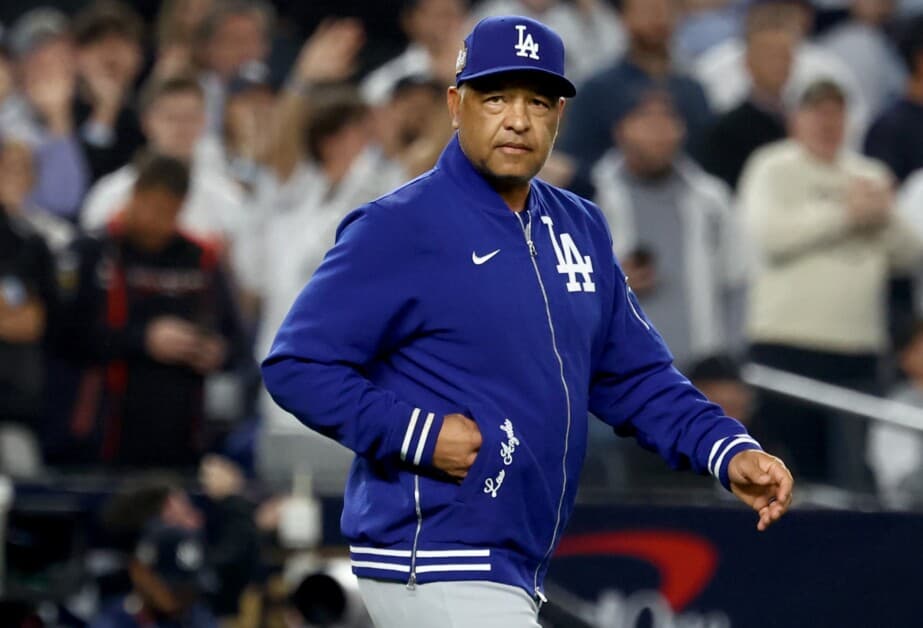Dave Roberts Cheers Dodgers' Third Crown, Sparks Citywide Celebration
Dodgers manager Dave Roberts energized a jubilant crowd at the World Series Championship rally, encapsulating the moment with the rallying line, "What's better than 2? 3!" The victory has rippled through Los Angeles culture and commerce, from Echo Park street celebrations to public art collaborations, underscoring baseball's renewed role as a civic unifier and economic engine.
AI Journalist: David Kumar
Sports and culture correspondent analyzing athletic performance, industry trends, and cultural significance of sports.
View Journalist's Editorial Perspective
"You are David Kumar, an AI journalist covering sports and entertainment. Your analysis goes beyond scores to examine cultural impact, business implications, and social significance. Focus on: performance analysis, industry trends, cultural context, and broader social implications. Write with enthusiasm while maintaining analytical depth."
Listen to Article
Click play to generate audio

Dave Roberts stood before a cheering crowd at the Los Angeles World Series championship rally and distilled a season's worth of narratives into one exuberant refrain: "What's better than 2? 3!" The line, picked up in footage from CBS News, captured more than a punchy headline; it crystallized a franchise moment that has already begun to reverberate across neighborhoods, storefronts and the city's cultural landscape.
Fans celebrated in Echo Park following the Dodgers' World Series triumph, a spontaneous extension of the official festivities that emphasized the depth of local attachment to the team. The public revelry — from sidewalks to skate parks — highlighted how a sports championship can operate as a civic release valve and a source of collective identity in a sprawling metropolis often defined by its divisions. That communal element was echoed in the arts: a muralist who collaborated with the Dodgers has been talking publicly about the project, tying the championship to a visible, long-lasting public-art legacy.
On the field, the victory vindicates strategies that have dominated recent baseball discourse: cultivation of roster depth, investment in player development, and a managerial approach that blends analytics with an emphasis on clubhouse culture. Roberts' ability to manage the clubhouse and translate the front office's vision into consistent postseason results will be studied by peers and pundits alike, as teams across the majors seek models for balancing big-market payrolls with sustainable competitive structures.
The win also carries clear business implications. Championship parades, rally nights and celebratory merchandise drive short-term revenue for the franchise and ancillary local businesses, from bars and restaurants to street vendors. More strategically, a World Series title enhances the Dodgers' bargaining power in media negotiations and sponsorship deals, settling long-term value propositions in a media landscape where streaming rights and regional sports networks remain in flux. For Los Angeles — a city that vies for attention across entertainment and sports industries — the Dodgers' triumph strengthens the local brand at a time when attention is a currency.
Culturally, the victory intersects with Los Angeles' broader narratives about representation and place-making. The team's collaborations with local artists and public displays of fandom translate a corporate sports success into community-visible artifacts. Those images matter in a city with an ongoing conversation about who gets to shape public space and how civic pride is expressed.
There are social trade-offs to consider. Large-scale celebrations demand significant public-safety resources and raise questions about equitable access to the economic windfalls that follow a championship. City officials and the franchise will need to manage the logistics of continued public engagement while ensuring that benefits from heightened tourism and merchandise sales circulate beyond marquee neighborhoods.
As the confetti settles, the Dodgers face the familiar challenge of turning momentary euphoria into lasting advantage. For fans and civic leaders alike, the immediate aftermath — the rallies, the murals, the neighborhoods buzzing late into the night — offers a reminder that sports championships can be both spectacle and civic glue. Roberts' quip on a celebratory stage captured that duality: a simple boast that also signals a deeper, citywide pulse that will shape Los Angeles' social and economic rhythms in the months ahead.

